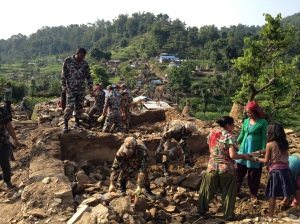India unbound- Gurucharan Das.
: A review and possible lessons for Nepal.
The faculty of perception enables individuals to reflect upon the affairs of the world. India unbound is a personal outlook at the transformation of a poverty
stricken country to one of the greatest international stories of the 21st
century. Amartya Sen succinctly puts it, “India unbound is a great mixture of
memoir, economic analysis, social investigation, political scrutiny and
managerial outlook being thrown into the understanding of India.”
It is a narration on India’s struggle away from the clutches
of a mammoth bureaucratic state to a free ‘liberated’ economy. It seeks to
answer how a country that symbolized as an epitome of inefficiency could pose
itself as one of the fastest growing economies of the world. The reforms of
1991 created a conducive environment for common Indian people to carve their
own destiny in contrast to a collectively organized “functioning” state. India
unbound clearly portrays the transition of this former colony to being a major
economy of the 21st century. The book is a Story of this “economic
revolution”.
Das traces the roots of evil in the Indian society that has
impeded capitalism to flourish. Das
portrays how money making endeavors are looked down upon in India. It is
culture that has always discouraged entrepreneurship in India. Some
intellectuals even call the current liberalization as ‘baniaization’ of Indian
society. One major hindrance for prosperity is lack of co-operation, the
stratification of the Indian society into various castes have beyond a doubt
created this problem. The relief is that market does not discriminate against
caste, creed, class, religion or color; hence, it seems to be the only cure out
of this system of injustice. There is a dire need for swift acceleration of
reforms that were introduced in 1991.
How prosperity of a nation is a direct consequence of
different policies in place is clearly depicted in the book. This can be seen
through the contrast between highly centralized and regulated India before and
after the liberalization of 1991.Das bluntly held Nehruvian socialism as responsible
for India’s failure to develop economically in contrast to some East Asian nations
which opted to open up their economies. The book proves how and why
nationalization impedes bright entrepreneurs from making the best for
themselves and eventually for the entire economy. The ‘License Raj’ made things
even worse and it only encouraged corruption and inefficiency in the working of
the state.
The book finally undermines the fallacy of India’s quest for
self-sufficiency and how it was the direct cause for economic stagnation. Economy is the underlying base upon which all
the social institutions place themselves. With the advent of liberalization the
entire landscape of the India has changed. In contrast to centralized
governance, the emergence of the ‘new middle class’ has had a very good impact
on the Indian politics via. Dissemination of information.
The Vedic adage ‘knowledge is wealth’ clearly sums up
India’s role in the coming century. As globalization has entered into a new
phase, knowledge economy is bound to be the new currency of the world as
compared to industry based economy. Hence, India is bound to be one of the
world leaders in the ongoing information centered world.
It is the entrepreneurs that have changed the face of India
today. India has come into limelight as a country of genius entrepreneurs. Das
talks about ‘the lost generation’ which the Indian political system curbed for
such a long time.
India unbound clearly illustrates how even developing
nations can follow suit from the Indian example if they want to realize
prosperity. The book finally resolves the debate of free economy and state
controlled economy, and how harmful the latter is on the nations’ economy.
Lessons
for Nepal
It is quintessential for Nepalese political parties to keep aside
ideological differences and strive for an efficient economic system. It is
necessary to “unleash Nepal” if it is to ever realize prosperity. In terms of
economics, Nepal could learn from the Indian mistakes and bring efficient
economic reforms in the country.
The book will surely make the reader think if it is viable for Nepal to
stay isolated in today’s economically integrated world. Nepal needs to
capitalize on the very fact that it lies in one of the world’s most crucial
geographical areas. Letting Indian and Chinese market penetrate would help it
realize unimaginable profits. Of course, this will require intensive research
to find out what works best for Nepal.
It needs to be understood that the current economic system is strangling
prosperity and hindering people to earn a living for themselves. Nepal needs to
focus on what shall facilitate prosperity. India unbound highlights the success
stories of Indian entrepreneurs and how positively it has impacted India as a
whole. If engines of growth lie in entrepreneurship, they ought to be looked
from a different perspective. Moreover
it needs to be understood that there is a direct relationship between economic
freedom and individual liberties.
It is high time for Nepal to start considering that it is its economic
state that will determine its overall well being in the long run.



No comments:
Post a Comment